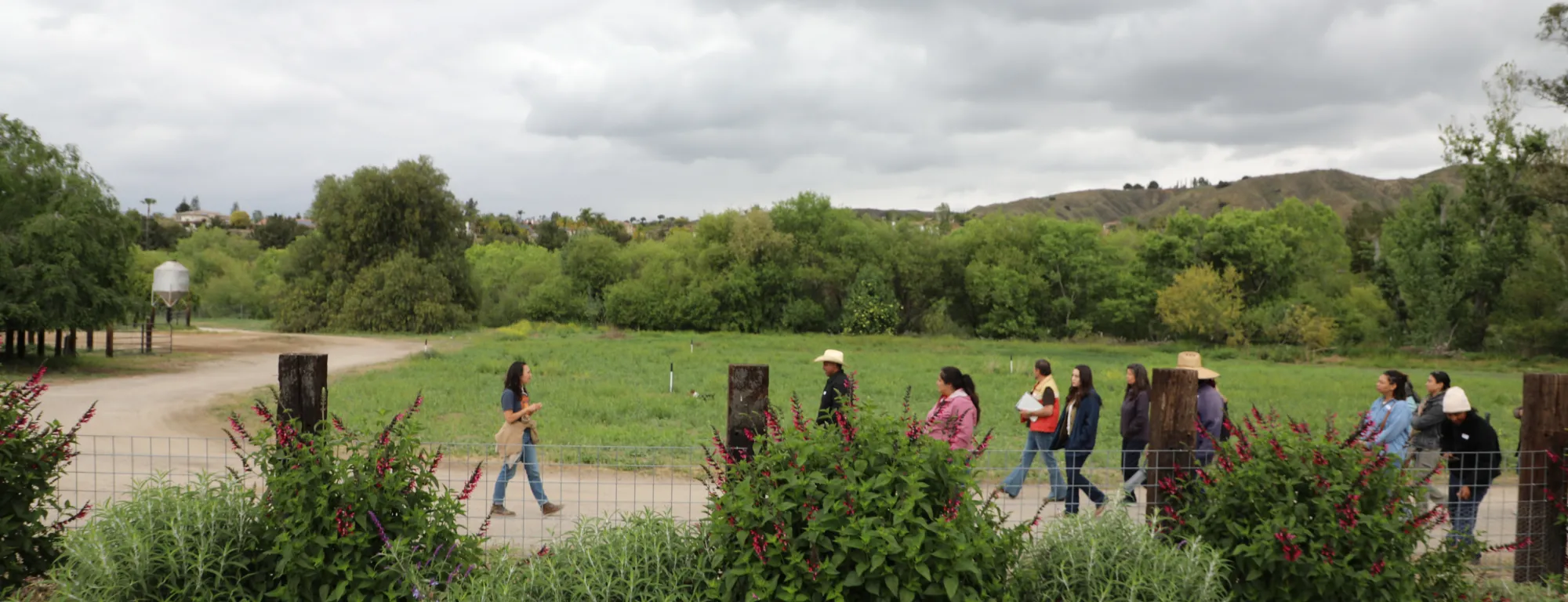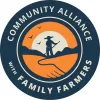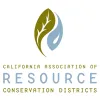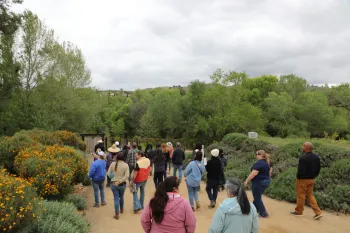
In California, land represents more than just property; it is the foundation of life, our food systems, environmental health, and community resilience. Yet for too many people, owning or managing land remains out of reach. The emerging generation of folks interested in becoming land stewards and existing farmers struggle to secure land for purchase, or access long-term leases for rent, while conservationists also face barriers to land stewardship; at the intersection of both these groups, our next generation and our historically underrepresented communities remain disproportionately excluded from land access opportunities.
The Climate Action & Land Equity (CALE) project is working to change that. Through funding from the California Department of Conservation (DOC), CALE builds partnerships and programs to elevate and expand land access opportunities, support climate-smart land management, and ensures that the future of California’s natural and working lands is inclusive, resilient, and sustainable.
As part of the first round of the Climate Smart Land Management Program, the DOC awarded $8.5 million to six organizations working to increase climate resilience across the state. UC Agriculture & Natural Resources (UC ANR) received $1.7 million in partnership with the Community Alliance with Family Farmers (CAFF), the California Association of Resource Conservation Districts (CARCD), and the California Farm Bureau Federation (CFBF). This funding supports efforts to address two of California’s most pressing land management challenges: equitable land access and land management diversification.
Why Land Equity Matters
For decades, California’s land ownership and management systems have favored those with financial resources and generational wealth, leaving many farmers, ranchers, stewards and conservationists with severely limited access to land. According to the latest agricultural census, land ownership remains overwhelmingly concentrated amongst older, white landholders, while racial and ethnic minorities (including Black, Indigenous and people of color or, BIPOC) farmers, small-scale producers, and socially underserved communities struggle to secure land tenure opportunities and ownership status.
One of the biggest challenges is the prevalence of limited and short-term land leases, many lasting fewer than five years. This limited tenure makes it difficult for farmers to invest in the longevity of their operations. It also limits land steward’s willingness and ability to invest in sustainable practices like soil health improvements, water conservation, and ecosystem restoration, all of which require longer term practices and care for the land. In this scenario, renting landowners may decide not to extend land tenure, or they may sell land due to economic pressures; in this case, tenants lose not only their land access (lease) but also their entire farming operation as well as any beneficial practices that sustained their economic livelihood and supported larger ecosystems.
At the same time, California faces rising climate risks, from drought and wildfires to soil degradation and biodiversity loss. CALE aims to support diverse land managers that employ innovative solutions to address these challenges, drawing on traditional ecological knowledge (TEK), regenerative farming, and climate-smart conservation techniques. CALE also aims to build relationships with emerging next generation land stewards and farmers by centering on the needs and extending opportunities to a vast group of historically underserved communities; in doing so, the project aims to ensure that all voices are heard, supported, and empowered to shape the future of land use in California, and to do so in a manner that has profound social, economic and ecological impacts.
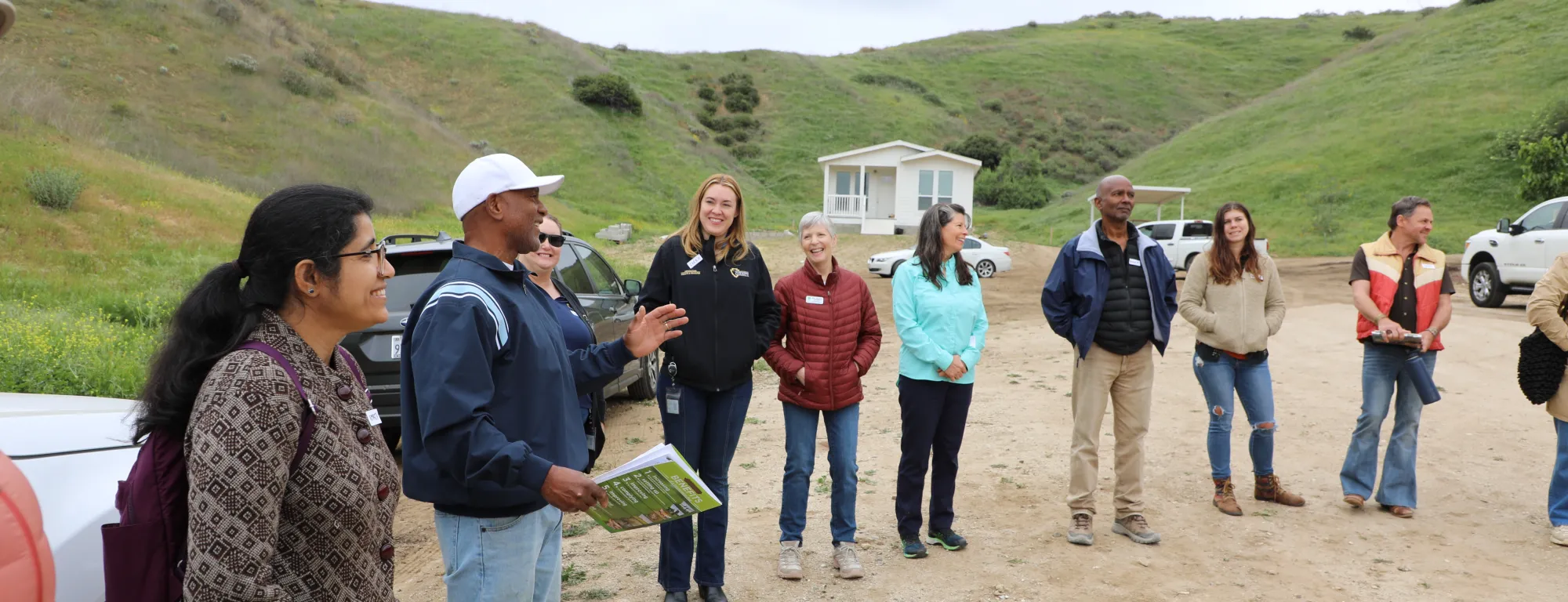
CALE Communities (who CALE serves)
CALE is designed to support and connect historically underrepresented communities. By intentionally focusing on California's most underrepresented communities, the project aims to increase equitable representation among land stewards, farmers, land managers and landowners, including:
- BIPOC farmers and land stewards who have faced systemic barriers to land access.
- California Native American Tribes seeking to reclaim and steward ancestral lands.
- Socially Disadvantaged Farmers and Ranchers (SDFRs), as defined by the California Department of Food and Agriculture (CDFA).
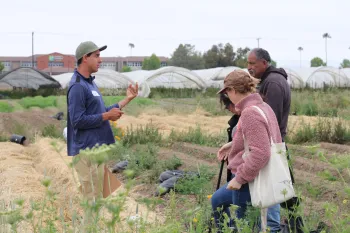
- Small-scale farmers managing less than 10 acres.
- First- and second-generation immigrant farmers.
- Young and beginning farmers under 35 who are working to establish long-term land security.
- Women and non-male-identifying landowners and land managers, who also remain underrepresented within agricultural and conservation leadership spaces.
- Farmworkers, tenants, and landless farmers who lack opportunities to land ownership.
- Climate-adapted land managers working in conservation, regenerative agriculture, and ecosystem restoration.
- English Language Learners (ELL) and non-English-speaking farmers who need language appropriate resources and support.
By working with these communities, CALE is not just expanding land access. It is reshaping the future of California’s agricultural and conservation landscape to represent our state fairly and allow communities to thrive.
Goals & Objectives
To create lasting change, CALE is developing collaborative climate action plans focused on capacity building, technical assistance, and policy change. These plans are designed to:
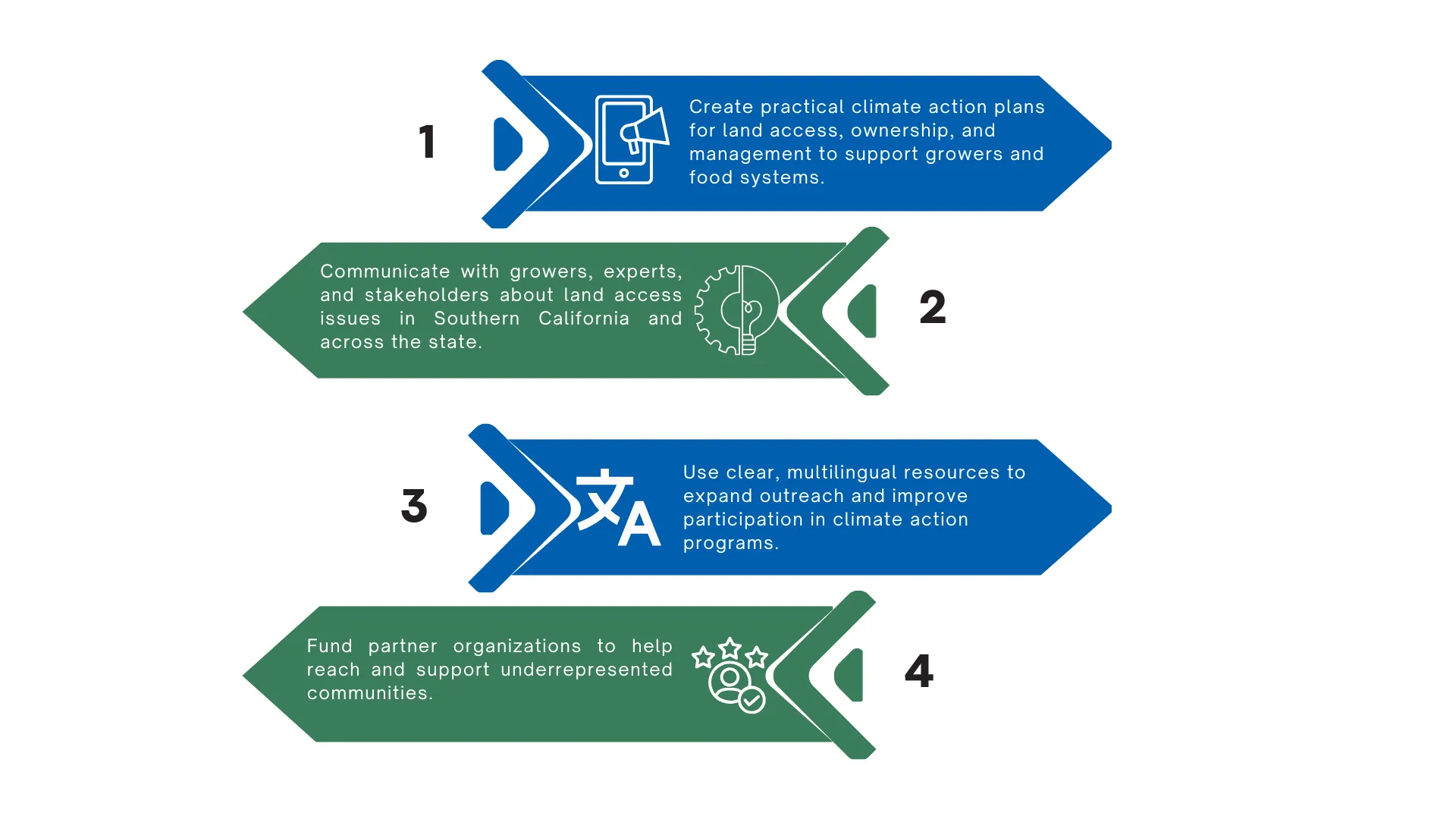
Our Team and Partners
The CALE project is made possible by a coalition of organizations and experts dedicated to advancing land equity and climate resilience.
Project Leadership
- Dr. Chandra Richards – Principal Investigator, UC ANR
- Cristina Murillo-Barrick – BIPOC Community Development Advisor, UC ANR
- Jamie Fanous – Community Alliance with Family Farmers (CAFF)
- Qi Zhou – California Association of Resource Conservation Districts (CARCD)
- Corrin Armstrong – California Farm Bureau Federation (CFBF)
- Amrita Mukherjee - Urban Agriculture / Small Farms Advisor, UC ANR
Sierra Reiss – Land Equity Project Manager, UC ANR
About Our Key Partners
CAFF has been a champion for small-scale and sustainable farmers in California for over 40 years. The organization provides technical assistance, policy advocacy, and community programs that empower farmers to thrive while prioritizing environmental stewardship. Through CALE, CAFF is helping to connect landowners with beginning and BIPOC farmers, providing education on sustainable farming practices, and supporting long-term land tenure solutions.
CARCD represents nearly 100 local Resource Conservation Districts (RCDs) across the state, working at the intersection of agriculture, conservation, and climate resilience. With deep roots in local communities, CARCD helps farmers, ranchers, and landowners implement conservation best practices that protect natural resources while improving productivity. In CALE, CARCD plays a critical role in ensuring that historically underserved farmers have access to technical assistance, funding opportunities, and land stewardship programs.
CFBF advocates for farmers and ranchers across California, ensuring that policies and programs support agricultural sustainability and land security. By partnering with CALE, CFBF is working to bridge gaps between landowners and small-scale farmers, promote equitable access to land, and develop policy recommendations that strengthen land tenure and conservation efforts.
Supporting California’s 30x30 Initiative
CALE’s work aligns with California’s 30x30 Initiative, which aims to conserve 30 percent of the state’s land and coastal waters by 2030. Through this initiative, CALE is helping to:
- Develop regional projects that promote long-term land access, conservation, and tenure security.
- Strengthen partnerships between governments, conservation groups, and historically underserved communities.
Prioritize inclusive, community-led solutions that emphasize technical assistance, workforce development, and sustainable land management.
Image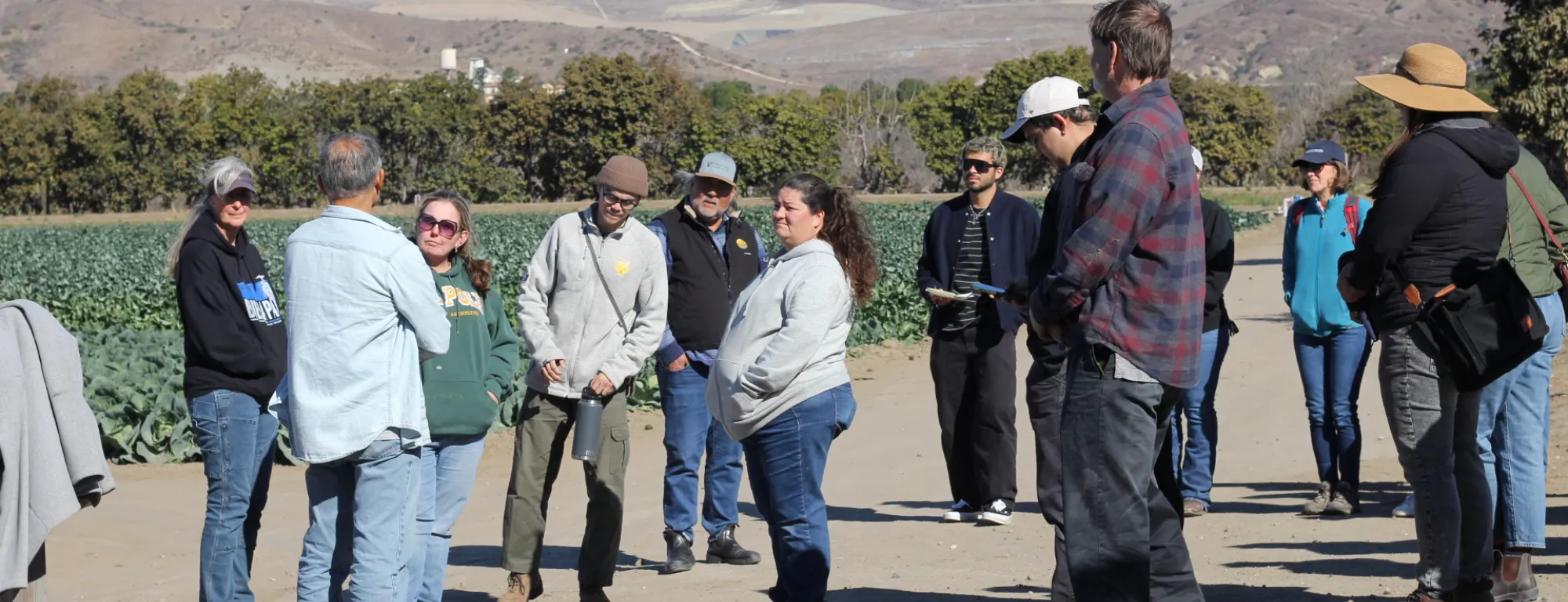
Timeline & Milestones
Since its launch, CALE has made steady progress in expanding land access and conservation efforts.
- May 2023: Grant application submitted to the DOC.
- November 2023: $1.7 million awarded to UC ANR through the Climate Smart Land Management Program.
- May 2024: Grant administration finalized; project implementation begins.
- 2025: Expansion of outreach events, technical assistance programs, and policy initiatives.
Already in 2025, CALE has hosted two major events to bring together farmers, land managers, conservation groups, and policymakers. These events have strengthened connections, identified key challenges, and fostered collaboration toward long-term solutions.
- Growing CALE Connections in Orange County - January 13th - Click here for additional information
- Growing CALE Connections in San Bernardino - April 17th - Click here for additional information
Events and workshops attended to further connect:
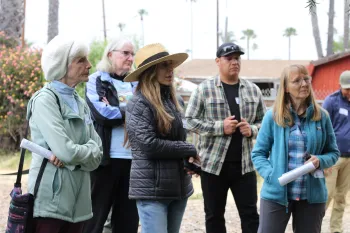
- Agricultural Land Equity Task Force Meeting - Virtual
- Voluntary Conservation Workshop – San Diego, CA
- California Climate Action Network (CalCAN) Summit – Davis, CA
- Tribal Climate and Health Adaptation Summit – Pala, CA
- North San Jacinto Valley Conservation Symposium – Perris, CA
- Southern California Tribal Workshop – Pala, CA
- California Agrotourism Summitt – San Diego, CA
- Eco-Farm Conference - Asilomar, CA
- UC ANR Tribal Partnerships Workshop – Davis, CA
- Landscape Integrated Pest Management Symposium – San Diego, CA
- San Diego Weed Management Symposium – San Diego, CA
- Agricultural Land Equity Task Force Meeting – Monterey, CA
- Avocado event – Valley Center, CA
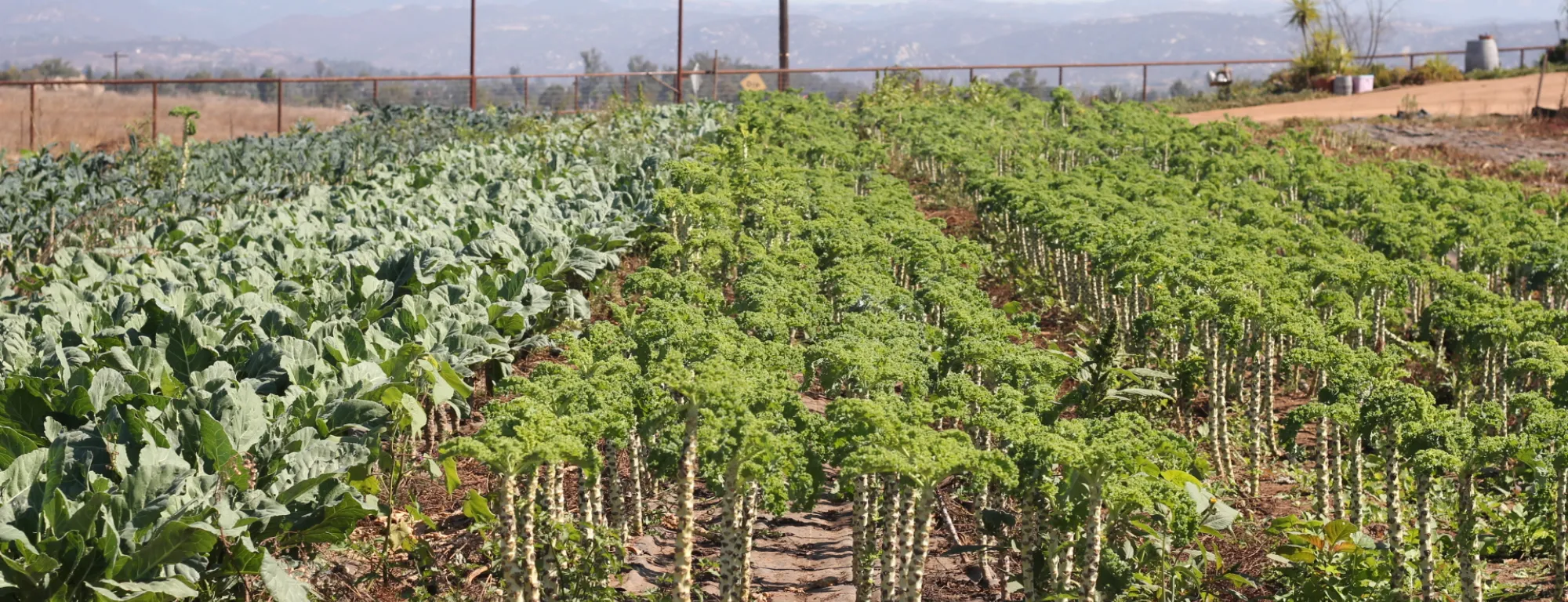
Stories from the Field: Real-World Impact
Land access challenges are not just policy issues. They affect real people every day.
Byron Nkhoma, a farmer in Ramona, grows leafy greens and vegetables at Hukama Produce. Since 2015, Byron and his wife Joyce have leased four acres of farmland from a local landholder. In less than a decade, they have already experienced two land ownership changes, each time facing the risk of displacement and uncertainty about their future.
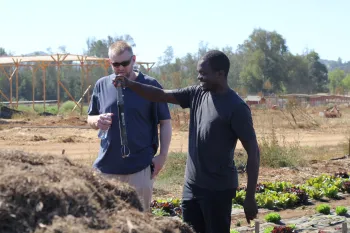
For Byron, stable land tenure is not just about business. It is about feeding the community, preserving the environment, and building generational wealth. Through CALE, he has access to technical support, grant resources, and conservation assistance to make his farm more resilient.
Stories like Byron’s highlight the need for long-term policy solutions that protect farmers, land stewards, and conservationists. CALE is committed to making those solutions a reality.
Get Involved
CALE’s success depends on collaboration, advocacy, and community action. Whether you are a farmer, conservationist, policymaker, or organization working on land access issues, there are many ways to support this effort.
Join our network by attending workshops, training programs, and networking events. Sign up for our newsletter to hear about upcoming events and to receive our Quarterly Newsletter.
CALE Newsletters
Winter 2025 English Newsletter - Winter 2025 Spanish Newsletter
Spring 2025 English Newsletter - Spring 2025 Spanish Newsletter
Additional Resources and Programs
- CALE Fact Sheet English
- CALE Fact Sheet Spanish
- Agricultural Land Equity Task Force (ALETF) Tribal Focus Group Key Takeaways 6/2/25
- Agricultural Land Equity Task Force (ALETF) Tribal Focus Group Key Takeaways 6/11/25
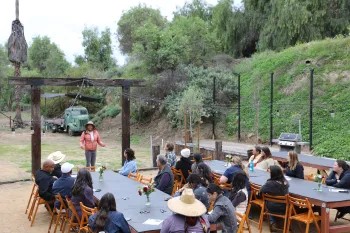
- Grower Program Workbook 2024
- California Farmlink
- California Farm Bureau Mentorship Program
- Environmental Meditation Services
Community Alliance with Family Farmers
- Healthy Soils Programs
- CDFA State Water Efficiency and Enhancement Program (SWEEP)
For more information, contact:
- Dr. Chandra Richards: Research & Grants - cmrichards@ucanr.edu
- Sierra Reiss: Outreach and Engagement - smreiss@ucanr.edu
- Cristina Murillo-Barrick: BIPOC Community Development - cmurillo@ucdavis.edu
- Amrita Mukherjee: Urban Agriculture / Small Farms Advisor - amukherjee@ucanr.edu
By working together, we can ensure that California’s lands remain accessible, sustainable, and resilient for future generations.
